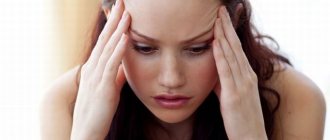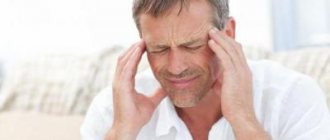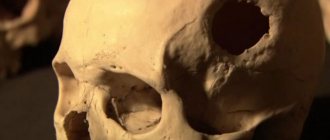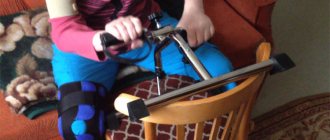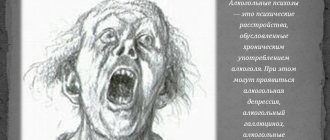What is psychosomatics?
The word psychosomatics in the medical community means the development of diseases, psychosis, and other pathological conditions that develop under the influence of a person’s psychological perception. We can say that all ailments in the body come from incorrect thinking; we ourselves attract them and contribute to their development. In fact, an experienced rehabilitation psychologist will say that many diseases occur not so much from an emotional state, but from mental health.
A person who is often subject to stress, depression, and easily moves into a state of aggression harms his body by subjecting it to constant “shocks.”
First of all, such manifestations of emotionality affect the functioning of the heart, blood vessels, and brain, but if a person has a disturbed psyche, damage is caused to the entire body as a whole. Moreover, there are many cases proving that psychosomatic disorders increase the chance of psychological complications after a stroke. In such cases, in addition to functional problems caused by poor circulation, a person faces the following troubles:
- dementia after stroke;
- depression;
- aggressive conditions;
- emotional imbalance.
Such complications not only complicate the rehabilitation process, but the very issue of recovery is jeopardized.
Due to the fact that the patient’s psyche is disturbed, his emotional state affects not only his health, it becomes a real test for loved ones, because they are the ones who experience the patient’s depressive, aggressive or other states.
Roots of psychosomatics
The past plays a huge role in the formation of personality, and you can read about working with it and the negative consequences of not doing this work in this article. Here we only want to say that in order to get rid of any personality trait or character, you will need to work through all the episodes of the past, postulates and beliefs that formed this trait, and there are thousands of them. But, in fact, we have not yet met people who would like to solve only one single problem in life or be cured of one single disease. Sooner or later, the question arises of a total elaboration of all one’s fears, convictions, sexual complexes, resentments, illusions, psychological traumas, all episodes of the past and fantasies about the future. Yes, it’s a colossal amount of work, but it’s worth it. It is precisely this kind of total work that the “Baybak” system is aimed at, the goal of which is to bring a person to the balance of soul and body, emotions and behavior.
So, if you really understand that health and garbage in your head in the form of complexes, fears and resentments are simply not compatible, and you understand that you cannot leave it like this, it is impossible to live with it any longer, then the Baybak system may be useful to you. To get acquainted with the system, just download it from the link at the bottom of the page, but you should decide whether to work with the system or not only after reading it.
List of diseases:
Study
A study was conducted to identify structural and functional disorders in the brain and evaluate their role in the formation of mental disorders in patients according to echoencephalography (EEG).
Who took part in the study?
The results of a clinical and psychopathological study of 53 patients who suffered a stroke were carefully analyzed by specialists. 41 people suffered from ischemic stroke, the rest from hemorrhagic stroke.
In every single one of them, the lesion was localized in the left hemisphere of the brain, and some speech disorders in the form of aphasia were detected, as well as disturbances in motor activity in the form of right-sided spastic hemiparesis.
Psychoorganic syndrome in the studied patients
All patients were divided according to POS into three groups:
- Patients who experienced symptoms of asthenia (33 people);
- Patients with the euphoric form of POS (8 people);
- Patients with asthenic variant of POS and depressive disorder (12 people).
How to cure?
The basis of psychosomatic cancer treatment is the elimination of psychological causes, liberation from past grievances and feelings of guilt. It is important to learn:
- recognize your negative emotions and yourself as the cause of stress;
- stop replaying old unpleasant memories in your head: unfair attitude of teachers, parents and others around you, change your attitude towards them;
- learn to forgive, prayers or your own texts will help with this. Instead of “I will never forgive” - “Give these people happiness and health”;
- monitor your emotional state;
- keep yourself busy with work and distract yourself;
- think more about yourself and say “I want...”.
Many people find it difficult to believe in the power of their own thoughts, especially when a diagnosis has already been made. And you can’t do it without the help of doctors. But even without faith in recovery, procedures, medications and operations can become useless. Therefore, cancer patients are recommended to seek help from a psychotherapist. But is it possible to start treatment with folk remedies? Yes, it can be a heart-to-heart conversation with a loved one.
By changing his attitude towards problems, a person will be able to mobilize all the forces of the body to fight pathology. Clots of negativity should not linger in a person and become the cause of a malignant tumor over time.
Examples from the book
In order to give an example of the approach of the author of the technique, we can consider several diseases.
| Physical locks | Emotional | Mental |
| Women's diseases | Most of the problems with women's health are related to the sexual sphere of her life. If there is no satisfaction from sex, then a feeling of underappreciation arises. A feeling of anger is formed, further exacerbating the inability to enjoy the process itself. A vicious circle arises. | The body signals the need for sexual change. You need to feel wanted. The feeling of manipulation needs to be eliminated or you need to start thinking the same way yourself. In order to eliminate a negative state, you need to let forgiveness into your soul. |
| Sexually transmitted diseases | The inability to part with the past combined with resentment | You need to learn to let go of situations, forgiving everything, even the smallest things. Stop carrying heavy emotional blocks associated with love relationships in your soul. |
| Back diseases | As a rule, they are caused by the fact that a person is caught in a certain vicious circle and he cannot escape from there. Every effort must be made to understand what is going wrong in life. And at what stage did the person turn onto the wrong path? | If pain prevents you from nodding from left to right, then this means that the person cannot say no in his life. If it is difficult to nod affirmatively, then, on the contrary, the person cannot say an affirmative yes. It is necessary to find out the reasons that led to this. |
| Stomach diseases | Inability to accept a certain person or situation associated with him. Hostility and even fear arise, which are not to the taste of the person himself. As a result, he himself suffers from it. | The main option for getting rid of the problem is to understand what causes such a negative feeling towards a particular person. Stop trying to change him and start accepting him for who he is. The best option is to try to love this person; it’s not for nothing that the stomach is located close to the heart. |
| Eye diseases | For example, glaucoma is caused by compression of the optic nerve. That is, a person experiences an emotional blockage. That is, people cannot experience what they saw in the past. | Free yourself from the past, let go of the situation. Start forgiving. You also need to learn to see other people's problems. This will help you see your own better. |
Naturally, everything that is given here is just small excerpts from the author’s book. You can get the full information if you find the book on the Internet and read it online. You can also listen to the book Listen to Your Body with us by watching the video above. Both the first and second options are available for free.
Manifestations of psychosomatics
Let's consider the relationship between the body and the psyche in one of the diseases - asthma. To put it in simple words, during an exacerbation, under the influence of allergens, an attack occurs and the person cannot breathe fully because he cannot exhale. What is the body trying to tell a person so harshly? The fact that a person does not want to live a full life, does not want to “breathe deeply”, does not want or believes that he does not have the right to breathe and live independently (especially in the case of constant use of an inhaler), that a person takes a lot, and gives with great difficulty (difficulty in exhaling). Plus, the presence of the allergen itself, which triggers an asthma attack, indicates that a person cannot stand something, protests against some events or actions, but cannot or does not allow himself to express this protest due to upbringing, stereotypes, fear opinions of others. And it was the constant ignoring of all these psychological factors that became the cause of the disease, and these same factors are the reason for its transition to the chronic stage. And this is how you can analyze each disease.
Development mechanism
It is believed that a tumor is a concentration of a situation of hopelessness. The disease begins when a person loses faith in himself, in others and in the whole world. Destructive thoughts and feelings destroy your own body.
Cancer psychosomatics researcher Dr. L. Leschen describes people who are most likely to have the disease:
- he cannot openly express his feelings and defend himself;
- he does not love himself and considers himself inferior;
- he has difficulty communicating with his parents;
- he is experiencing emotional loss.
Cancer can kill such a patient in just six months.
Scientists studying psychosomatics name the following reasons that trigger changes in cells:
- a person has an insoluble situation in his life, and he feels helpless;
- depression begins to suppress the immune system, which negatively affects the entire body, including cells;
- due to a malfunction in the immune system, some cells change their structure and functions.
Scientists back in the 80s of the 20th century noted the influence of the central nervous system on immune cells. They found that it is the loss of interest in life that is decisive. It is not for nothing that the psychological factors of cancer are called psychological carcinogens.
Researchers' opinion
Writer and psychologist Louise Hay claims that a stroke develops when a person categorically does not agree to change something in himself , despite the fact that life makes it clear to him that the time has come for change, that his brain can no longer stand it. But the stubborn man claims that he “would rather die than step over his own principles.” As a result, he himself creates this situation.
Canadian researcher Liz Burbo is sure that people who have suffered a stroke have significant difficulties with their own “I” ; they are in a state of acute conflict with the world and themselves.
Psychotherapist Valery Sinelnikov claims that the basis of the illness is feelings such as jealousy and hatred , but not ordinary, moderate ones, but literally “paralyzing” a person. Also, the doctor emphasizes, pathology threatens those who categorically refuse to accept their life and destiny.
Almost all researchers tend to argue that people who are more susceptible to stroke are those who are inflexible, “stuck” in their old beliefs and do not want to change them. This explains the wide prevalence of pathology among people of retirement age.
general information
A stroke is an acute disruption of the blood supply to the brain, which leads to damage to a specific area. A stroke can be either hemorrhagic or associated with oxygen deficiency, that is, ischemic. It manifests itself as a sudden feeling of weakness in the arms and legs, asymmetrical “distortion” of the face, disturbances of consciousness, speech, vision, and dizziness.
In medicine, there is even such a definition of stroke as a vascular accident. Ischemic pathology is also called cerebral infarction, hemorrhagic stroke is an atraumatic lesion in which a vessel ruptures with hemorrhage.
The reasons for this in medicine are considered to be high blood pressure, heart pathologies and atherosclerosis. The likelihood of a stroke increases if a person eats poorly, smokes, abuses alcohol, or experiences acute stress. The risk of stroke increases in women who take oral contraceptives for a long time. Doctors also emphasize the presence of a hereditary factor - if direct relatives have had a stroke, then the likelihood of such a pathology increases.
What are psychosomatic diseases
The name “psychosomatic diseases” speaks for itself; these are diseases whose causes lie in the psyche. However, this does not mean that these are some kind of fake, far-fetched and not real diseases at all. They are very real, only the causes of these diseases are not only in the entry of the virus into the body, not in the lack or excess of some hormone, but much deeper. What is the reason, for example, that the hormone stopped being produced in the required quantities? Isn’t it just that the body is tired of performing its prescribed functions without failure? No.
Our body just adapts to our mood, our thoughts. Since most people do not even track or realize their thoughts and emotions, our body acts as a very convenient means of feedback, showing that in this part of it, under the influence of negative emotions, something is not working correctly. Our body begins to signal pain and discomfort even in extreme cases, when our emotions remain unheard for a long time, and mental pain continues to grow. And for this he should rather say thank you than be offended and complain that it is letting us down and not allowing us to live in peace.
Interesting cases
Indifference and stroke ≠ laziness
One patient after a stroke developed an indifferent attitude towards his painful condition. He lay in bed for hours, mindlessly watching all the programs on TV. Those close to the patient believed that laziness was to blame and did not touch him.
But this condition is explained by damage to certain areas of the brain. And here, relatives must patiently encourage the victim to take action, try to induce a desire to move, and engage in self-care. As soon as the relatives gained patience and began to support the patient, he began to recover.
Psychosomatic causes of stroke
Dizziness, headaches, deterioration of memory, vision, hearing, and so on - all these are signs of problems with blood circulation in the brain and precursors of a stroke. In most cases, the causes of “brain stroke” are pathologies of the cardiovascular system and concomitant diseases. But if we associate a stroke with a person’s psychological conditions and psychosomatics, the reasons contributing to its development will be the following:
- Constant stress - problems at work, frequent worries and worries.
- Jealousy - discord in the family, groundless or justified jealousy, results in serious mental disorders.
- Anger and hatred are such strong feelings, even if they are pathological manifestations, also contribute to the development of an attack.
- Success race - we are talking about competition with oneself to achieve some goals or the desire to surpass others. Such states are emotionally exhausting.
- Depression is an abnormal condition for a healthy person; only its manifestation or a state of psychosis can indicate problems in the head.
All the factors described indicate that the person has a mental disorder. Constant exposure to such conditions provokes health problems, increasing the likelihood of developing a stroke; they cannot be ignored.
Join support groups via Skype and face-to-face classes in Moscow and the regions.
Diagnostics
The diagnosis of mental disorders against the background of cerebrovascular disorders is made on the basis of the patient’s complaints, the presence of a stroke, objective studies of the doctor himself, and through instrumental confirmation.
The psychiatrist must externally assess the patient’s behavior, his body movements, speech, conduct psychological tests and talk in more detail about complaints, about what causes certain deviations in the psycho-emotional status.
Instrumentally, one can only confirm the presence of a stroke and cerebrovascular accident. For this purpose, magnetic resonance and computed tomography, Doppler sonography, and fundus examination are performed.
In a biochemical blood test, a decrease in the amount of lipids is possible.
After making a diagnosis and determining the type of mental disorder, the doctor must first prescribe medications that improve cerebral circulation. These include Vinpocetine, Sermion, Phenilin.
If there is a risk of developing blood clots, it is necessary to use anticoagulants, for example, aspirin with constant monitoring of the INR. Nootropics such as Piracetam, Aminalon, and Pantogam are recommended for treatment.
In the case of explosive psychopathy, therapy with sleeping pills, anti-anxiety drugs, and sedative medications is necessary: Valocordin, bromides, tablets based on motherwort, St. John's wort and valerian.
For asthenia and apathy, adaptogens have a good effect: ginseng, eleutherococcus, radiola rosea, lemongrass. In some countries, loading doses of B vitamins are used.
Treatment for dementia includes not only the use of medications, but also psychotherapy. You need to talk to the patient, listen to his personal experiences, reassure, encourage, explain what’s what. Psychotherapeutic methods are used, including autogenic training, hypnosis, and psychoanalysis.
The role of a psychotherapist in the treatment of a brain tumor
New growths can be identified in a timely manner during a medical examination, which in most cases is caused by ailments. The psychosomatics of the tumor is determined by psychotherapists who, with the help of a course of psychotherapy, stop the progression. Even when everything seems to be lost, most patients experience positive dynamics after consultations and treatment with a psychotherapist.
Psychological disorders that have the potential to develop into a brain tumor (the psychosomatics of which are described above) can only be eliminated by qualified specialists. Of course, without the help of the patient himself, recovery is impossible.
Psychosomatic consequences of stroke
As mentioned earlier, a person who has experienced a stroke also faces psychosomatic problems. This is not only due to pathological disorders caused in certain areas of the brain or manifestations of dementia. Loss of motor functions, inability to perform tasks that previously seemed simple, to take care of oneself, etc. All this makes the patient feel inferior, hence the following psychological problems appear.
Aggression after stroke
Often these behaviors are caused by lesions in the temporal lobe involving the parahippocampal or anterior cingulate cortex. In this case, patients experience psychosis and emotional imbalance. To get rid of such complications, sedatives may be required, but the most important thing is the understanding attitude of others and tolerance.
Depression after stroke
Another severe disorder, which is a certain type of psychosomatic complication. The reasons for its development are the same, but now, in addition to psychosis and anger, it is noticeable that the patient has become depressed, detached, there is a general deterioration of not only psychological, but also physical condition, dizziness. In such situations, in addition to the main treatment, the patient is prescribed antidepressants.
Dementia after stroke
This manifestation is difficult to consider as a consequence of psychotic problems; rather, it is a direct consequence of certain disorders caused by extensive damage. It is difficult to cure a person with such a diagnosis; means are used aimed at activating the work of brain neurons and stimulating mental activity, as well as a long course of therapy.
Psychogenic dizziness
Such dizziness is direct evidence of certain disorders directly related to the psychological and mental state. Depending on the nature of the problem, both antidepressants and sedatives are used.
Mental disorders after a stroke are much broader in nature; the common pathological behavioral disorders of patients who have suffered an attack are listed above. In addition, if before the stroke the patient was susceptible to certain psychosomatic problems, the likelihood of their occurrence after the “stroke” increases significantly. What to do and how to act in such situations is decided by the attending physician, however, for full treatment, the help of more specialized specialists may be required, among whom should be a rehabilitation psychologist.
Clinical picture of dementia
Mental disorders after a stroke can be divided into several groups:
- Asthenic;
- Explosive;
- Apathetic;
- Euphoric.
Based on the time of occurrence, we can distinguish early ones, those that arise several months after the development of the pathology, and late ones.
The asthenic type of mental disorder is characterized by low interest in the outside world, increased sensitivity to external stimuli, and decreased performance. There is a disorder of memory, attentiveness, and speech inhibition.
The asthenic type includes dementia - a sharp decrease in cognitive ability and loss of once acquired skills, in other words, dementia. With dementia, patients complain of constant depression, dizziness, general malaise, and weakness.
The extreme stage of the disease is forgetting one’s own name, place of residence, date of birth, and the names of the most basic things.
Explosive psychopathy is the complete opposite of asthenia in emotional terms. Patients are highly agitated, quick-tempered, aggressive, and can make noise over the slightest reason. After an emotional outburst, a person feels much better, describing the current situation as a “loss of self-control.”
Apathy differs from the other two types of disorders in its complete indifference to the world around it. The patient feels neither aggression, nor sadness, nor joy. The absence of any emotions is accompanied by loss of appetite, constant drowsiness, and laziness. Against the background of apathy, schizophrenia can develop - a disorder of thinking and perception of the surrounding world, combined with delusions, manic ideas, paranoia and hallucinations.
Euphoria is an uncommon mental disorder. The person is in a relaxed state, in high spirits, without any special reason. In this case, the patient is slightly inhibited, experiences feelings of derealization, and experiences a periodic surge of strength and energy. Against the background of euphoria, asthenia and apathy may develop as a consequence of the exhaustion of the body’s reserves.
What to do with psychosomatics?
This article is for those who have already begun to understand that
the roots of all problems are in the head, as well as for those who have already noticed the close connection between the psyche and the body. Surely you have noticed more than once that as soon as an old painful problem pops up, there is an echo of it in the body in the form of an exacerbation of a chronic disease, a rise in temperature, an exacerbation of allergies, etc. This is one of the signs that the disease is psychosomatic.
Note to the patient
If any of the signs of a stroke appear, it is important to immediately call an ambulance. Self-medication can be harmful and greatly aggravate the situation. It is forbidden to use any traditional methods of treatment without the recommendation of a doctor, as this can be fatal.
Stroke is a very dangerous disease that can occur for many reasons. To prevent the development of pathology, you should lead a healthy lifestyle and regularly undergo a thorough medical examination by a doctor. In the event that the illness arose due to psychological disorders, it is important to visit a psychotherapist - this will help the patient quickly restore his health and prevent a second blow.
Psychosomatics – body protest
But we are primarily interested in what can be done about it,
After all, it’s not so easy to finally give yourself the will to express a protest against what a person cannot stand (in the case of asthma), rather than habitually reaching for an inhaler. We are not given the root reasons why these automatisms arose, and until we eliminate them, we will not be able to react differently. Moreover, in the explanation of psychosomatic diseases, multifactoriality is recognized - a set of causes that interact with each other, that is, the sources of one disease can be several psychological problems at once, and its occurrence can also be influenced by a large number of related, at first glance not even related , problems. The reasons, as we said above, are ourselves, the features of our personality that were formed as a result of upbringing, as well as features of character and temperament, precisely what a person at first glance is proud of because it is precisely these features that make him different from what he is. All.
Change your life by changing your thoughts
Life is the way we see it in our thoughts.
If, due to objective circumstances, you cannot change what you want, then change your vision of this situation and your attitude towards it. Try to always find only positive aspects in everything . “Everything that is done is for the better.”
You can even take a piece of paper and write on it all the positive aspects and consequences of your situation.
You can go another way.
There are many professional psychological trainings that teach methods for solving a problem by changing a person’s attitude towards it. Quite tough, but effective. For example, you are simply annoyed that no one in your family washes the dishes, and you are already tired after work, after preparing dinner, and so on. You don't even have a minute to sit and relax.
Liz Burbo now
Liz Burbo has achieved public recognition in the professional community and among interested audiences.
7 facts about Vladimir Pozner that you didn’t know
In 2019, she conducts seminars and webinars, works as a coach and psychologist, and does not stop her literary activity. The author's works are now considered to be among the best practical guides to self-knowledge.
There are communities on social networks dedicated to trainings and works by Burbo. They publish photos of the writer, quotes, and reviews of people who practiced her technique.
Types of cancer and their causes
The location of the malignant tumor depends on emotions. Examples of some harmful attitudes are:
- Psychosomatics of breast cancer states that pathology arises due to problems in the sexual sphere, hidden emotions, dependence on people, and despair. In childhood, the patients felt lonely and abandoned, and in adulthood they acquired a person who became their meaning of existence. If they lose it too, then they quickly become patients at the oncology clinic. Another victim may be a woman who has taken on all the roles of family life at once: wives, mothers, and breadwinners. The relationship with my husband is not going well. Constant “I have to” can lead in the future to resentment towards loved ones because of their ingratitude. You can't put yourself last.
- The psychosomatics of stomach cancer, as well as intestinal cancer, cites the inability to “digest” any situation as the cause of the disease. The person rejects the help of family and friends. With bleeding, oncology is already powerless.
- Psychosomatics of brain cancer diagnoses in patients inertia, stubbornness, and adherence to old behavior patterns. Brain tumors are sometimes caused by selfishness and self-focus.
- Liver tumors are caused by a lack of something: money, love, care. The liver gradually accumulates these emotions and forms a tumor.
- Lung pathology develops in people who are faced with the spiritual callousness of family and friends. The person is disappointed, deprived of freedom for his actions.
- Skin cancer occurs due to childhood grievances, defenselessness and the inability to express one's anger.
- Blood cancer causes anger and anger towards loved ones.
- Changes in the thyroid gland occur in kind but vulnerable people who are afraid of other people's condemnation.
- Pancreas - due to conflict with immediate family.
- Cancer of the female genital organs is associated with rejection of one's femininity and unforgiven resentment towards partners. Tumors of the uterus and cervix also arise from sexual dissatisfaction.
- Prostate cancer. The patient is burdened by a failed relationship with a woman. His masculinity could have been seriously damaged by his wife's betrayal.
Such patterns are carefully studied by scientists and revealed in conversations with patients.
Psychomatics of stroke: how our emotions lead to a dangerous outcome
The psychomatics of stroke, like other diseases, is a controversial topic around which various proposals and theories are developing.
The fact that a fatal attack can occur due to psychological problems is proven by many real-life cases.
Stress, unstable emotions, and self-conflict are the factors that can lead to a stroke even in a physically healthy person.
What is a stroke?
A stroke is an acute disruption of blood flow in the brain area. The attack can last from several minutes to several hours. During this time, due to insufficient nutrition of tissues and cells, they die. Depending on which part of the brain is affected, the consequences of the disease will depend.
It is customary to distinguish between two types of stroke:
- Ischemic. Occurs when a vessel is blocked;
- Hemorrhagic. Occurs when a vessel ruptures due to strong blood flow.
The second type is less common.
A stroke attack usually occurs with fairly severe symptoms. Among which:
- Acute headache;
- Nausea and vomiting;
- Weakness in the limbs;
- Impaired concentration of movement;
- Impaired visual, speech, and auditory functions.
Acute headache is a symptom of stroke
A micro-stroke may also occur, in which the blood flow normalizes on its own. In this case, the symptoms of the attack can be greatly muted and expressed only in dizziness and headache.
The role of psychosomatics in the development of pathologies in the body
Psychomatics as a science became widespread in the mid-20th century. This direction in medicine implies that there is a very close connection between a person’s mental state and his diseases. It is assumed that a number of pathologies arise or receive their active development precisely as a result of various kinds of experiences, stress, and emotionally unstable states.
Initially, it was believed that the following common diseases were most susceptible to psychomatism:
- Hypertension;
- Arthritis;
- Bronchial asthma;
- Hyperthyroid syndrome;
- Stomach ulcer;
- Neurodermatitis.
Over time, the list expanded to include many other pathologies, including stroke.
According to various theories, provoking factors of psychomatic reactions can be:
- Self-hypnosis;
- Self-flagellation;
- Internal self-conflict;
- Psychological traumas from the past;
- Identifying oneself with another person;
- The presence of a conditional benefit from the disease.
The mechanism of occurrence of psychomatic reactions implies that a person does not want to accept and process some emotions psychologically, or does it incorrectly: he is afraid to admit something to himself, tries to erase unpleasant memories from his memory, seeks attention from loved ones in any way, including the willingness to cause them pity, getting sick. As a result, emotional stress, which gradually accumulates and increases, leads to disruption of autonomic functions, which in turn negatively affects the functioning of internal organs and systems.
Psychological causes of stroke
Various theories and schools put forward their points of view on what most often becomes the psychological cause of stroke. The most popular of them are:
- World-famous American psychologist Louise Hay. According to her point of view, a stroke occurs when a person loses interest in life, stops enjoying little things and gets stuck in routine. Also, among the causes of this disease, Hay identified an internal denial of life and a complete reluctance to change one’s life and oneself;
- Russian researcher Valery Sinelnikov examines 4 main causes of stroke. Among them: pathological jealousy, dissatisfaction with one’s life and reluctance to adapt to innovations, fear of being lonely, constant suppression of emotions. In his practice, Sinelnikov encountered precisely these categories of people who survived a stroke;
- Canadian psychologist Liz Burbo claims that a stroke is a consequence of a conflict with one’s own self. At the moment when principles and attitudes go against the real situation, consciousness can malfunction and it all ends in a stroke;
- Russian psychologist Elena psychologist, in her works on the study of stroke, suggests that the phenomenon occurs at a moment when a person cannot solve a certain problem for a long time and, when the situation reaches its peak, a disruption of cerebral blood flow occurs, in simple words, a stroke;
- Psychologist and practitioner Oleg Torsunov believes that pathology arises due to such negative factors as envy, greed, lust, as well as anger and madness.
Louise Hay states that stroke occurs when a person is in a routine and has lost interest in life
Thus, there is no single cause of a stroke of a psychological nature, although in general they are all somewhat similar to each other.
Methods and installations for healing
Psychosomatic methods of treating diseases, including stroke, imply that a person can influence the restorative work of his body with his own consciousness.
It is believed that cells and nerve endings that die during an attack can be replaced with new ones. To do this, the body needs not only to recreate them, but also to re-teach them to perform their functions.
Settings that can help do this sound something like this:
- “Every day my body is getting healthier. I feel like a healthy person”;
- “My new cells are working fully”;
- “Every day my body remembers all its functions and learns to perform them again”;
- “I am developing and will always continue to do so”;
- "I am strong. I can";
- “Everything comes easy to me. I recover quickly”;
- “I live a happy life”;
- “I am grateful for my life”;
- “My body breathes new life.”
Working through these and similar settings will allow you to set your body up for a quick and painless recovery.
In many cases, the study of psychological attitudes does not produce results. Supporters of psychomatics are confident that the reason for this is not the ineffectiveness of the technique, but the incorrect work of the patients themselves. A fairly well-known scientist from America, Lipton B.
argues that most people act only on the superficial level of consciousness, which is insufficient to obtain results. Controlling your own deeper subconscious may be impossible for a significant proportion of people.
In this case, professional psychologists can come to their aid.
Faith, prayers, meditation, affirmations, self-hypnosis - all this can help achieve the main goal, namely to reach your subconscious.
Psychosomatic prevention measures
Stroke prevention includes various measures.
Thus, traditional medicine offers timely monitoring and treatment of cardiovascular and neurological diseases, leading a healthy lifestyle and consuming vitamin complexes.
As for psychomatics, from this side prevention implies psychological work, both on one’s own and under the guidance of qualified specialists.
General preventive measures include:
- Avoidance of stressful situations;
- Working on fears and worries;
- Control over your emotional state;
- Maintaining an optimal balance between work and rest. Active mental activity should always be replaced by a break and relaxation.
Controlling your emotional state is part of stroke prevention
Psychological books and materials, affirmations, and relaxing hobbies such as yoga can help with this.
If necessary, a person can seek help from professionals - psychologists and psychotherapists. There are various methods of psychological correction. Among them:
- Trainings;
- Autogenic training;
- Psychological games;
- Working with the subconscious.
Another important block in stroke prevention is the nature of nutrition. It directly affects not only the physical, but also the emotional state of a person.
Thus, some foods can stimulate the production of endorphins. Others saturate the body with essential vitamins and minerals.
All this directly affects the psycho-emotional stability of a person, reducing the risk of stroke.
Source: https://health-post.ru/insult-psihomatika-01/
Favorite hobby
Find some interesting business or hobby for yourself. Start developing and improving yourself in this area.
What do you want to do? What do you get great pleasure from? Maybe it’s cooking delicious food, growing flowers in the country, swimming in the pool? Don’t put it off for later and don’t deny yourself a hobby that brings you peace, good emotions, that you would like to do in any free minute. If the soul wants it, then it is good for health.



